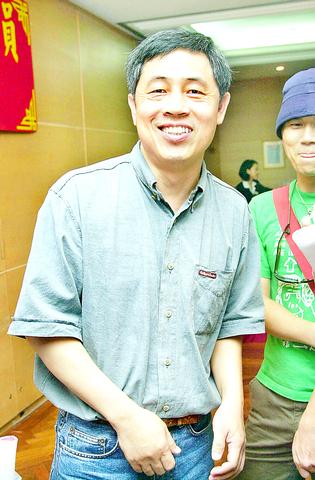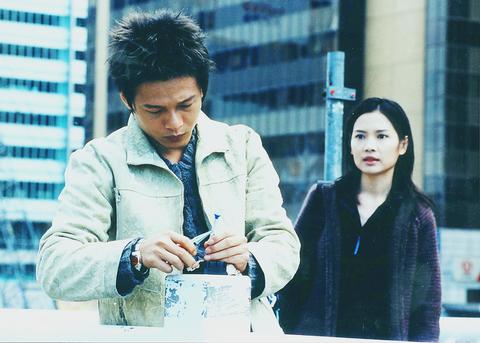A few years ago at an international film festival, Taiwanese director Wu Nien-jen (吳
Does the word `tu duu chih' mean `sound editing' in your language? The word is always seen at the credit roll."

PHOTO : WEI CHIA-CHIH, TAIPEI TIMES
Wu said that this was the name of a person -- it just happened that this person was virtually synonymous with sound editing in Taiwan.

PHOTO: FORTISSIMO
The man referred to was Tu Duu-chih (杜
This year at Cannes, Tu received the technical award for sound editing work on Millennium Mambo (千

PHOTO: HOME GREEN
"He has deserved the award for a long time now," said Hou, who directedMillennium Mambo.

PHOTO: CMPC
According to Hsiao Ya-chuan (蕭
A number of scenes in The Flowers of Shanghai centered on characters eating and drinking round a table. When the shot began, Hou would usually just say, "Okay, you can start now," and leave the actors to develop a situation through improvisational dialogue. "The recordist wouldn't know which lines spoken by which actor were the important ones," said Hsiao.
"The only thing you could do was to guess, and observe carefully," said Tu. "Sometimes you simply didn't catch anything to record, and the shot has to be made again," he said.
It is Tu's ability to work in the difficult circumstances of a Hou shoot that Hsiao, now a director in his own right, most admires about him. "It takes experience, intuition and courage to deal with that kind of situation," he said. "Having worked with Tu on my first short film, I have brought him in on all my other projects, if possible," Hsiao said.
Tu has always been in strong demand, and has been the sound editor for about 70 percent of Taiwanese films released since the mid-1980s.
One of Tu's major contributions to the Taiwan film industry has been the introduction of synchronized sound. The first such feature film in Taiwan to be shot entirely with sync sound was Hou's The City of Sadness (悲
In the 1970s and before, most Taiwanese films tended to focus on war, martial arts and family romance genres, in which sound was invariably dubbed. Even in the 1980s, when realism gradually became the cinematic mainstream, many films only had partial sync sound due to a shortage of technical personnel.
"Five years before the shooting of City of Sadness, about 20 years ago now, I began to work on the technique of synchronized sound recording," Tu recalled.
"At that time, a group of directors had recently returned from the US, and they gave me a chance to watch and learn during the post production process," Tu said of this period when he was an assistant in Central Motion Picture Corp's (CMPC) sound department.
"In the early days when we were making realist films, the boom poles we used for the mics were the kind of poles that people used to hang their laundry out on. The 32mm cameras we used were also very noisy, so they had to be covered with two to three blankets, so that after a few takes, the cameraman would emerge tired and sweaty," Tu recalled.
Tu's first use of sync sound was in a government project in conjunction with Edward Yang.
"The company assigned us a 16mm short film to promote a certain government policy. This was a great time to try the new technique [sync sound] -- even though we had to spend our own money to buy equipment."
After the success of City of Sadness, Hou bought a brand new set of sync recording equipment for Tu. "Hou thought the film was making money, and when he discovered there were bills still to pay, he'd already bought the equipment. So he had to take out loans to buy me the equipment, and I am still thankful for this."
With this new equipment, Tu began to work on more films using synchronized sound, taking the first steps to introducing this technique throughout the industry. "Now, only a couple of short films each year may not use sync sound," Tu said.
As a young man, Tu said, he loved stereos and so he looked for a job that dealt with the sound part of movies. "But later, I became fascinated by the use of sound in a movie context. This was when I fell in love with films, and the films of Hou Hsiao-hsien and Edward Yang in particular. From then on I endeavored to use sound to enhance the meanings they sought to express in their movies," Tu said.
Such is his commitment to cinema that even his memory is pegged to film. "I don't remember in what year my son was born. But I do remember that it was while I was working on Yang's A day on the Beach (海灘的一天).
Tu now has his own sound editing studio with a staff of eight that handles the sound editing for 90 percent of films made in Hong Kong and Taiwan. He himself is now currently associated with Chen Kuo-fu's (
But after 30 years of experience and a room full of prizes, his studio still failed to qualify for government subsidies supporting the local film industry. The reason is that he is only a studio, not a company.
"That's a bit funny but I don't care much," Tu said. "Doing a good job is more important to me. My greatest happiness is when a director tells me,`You make great sound.' I'm this kind of person."

May 18 to May 24 Pastor Yang Hsu’s (楊煦) congregation was shocked upon seeing the land he chose to build his orphanage. It was surrounded by mountains on three sides, and the only way to access it was to cross a river by foot. The soil was poor due to runoff, and large rocks strewn across the plot prevented much from growing. In addition, there was no running water or electricity. But it was all Yang could afford. He and his Indigenous Atayal wife Lin Feng-ying (林鳳英) had already been caring for 24 orphans in their home, and they were in

On May 2, Chinese Nationalist Party (KMT) Chairman Eric Chu (朱立倫), at a meeting in support of Taipei city councilors at party headquarters, compared President William Lai (賴清德) to Hitler. Chu claimed that unlike any other democracy worldwide in history, no other leader was rooting out opposing parties like Lai and the Democratic Progressive Party (DPP). That his statements are wildly inaccurate was not the point. It was a rallying cry, not a history lesson. This was intentional to provoke the international diplomatic community into a response, which was promptly provided. Both the German and Israeli offices issued statements on Facebook

Even by the standards of Ukraine’s International Legion, which comprises volunteers from over 55 countries, Han has an unusual backstory. Born in Taichung, he grew up in Costa Rica — then one of Taiwan’s diplomatic allies — where a relative worked for the embassy. After attending an American international high school in San Jose, Costa Rica’s capital, Han — who prefers to use only his given name for OPSEC (operations security) reasons — moved to the US in his teens. He attended Penn State University before returning to Taiwan to work in the semiconductor industry in Kaohsiung, where he

President William Lai (賴清德) yesterday delivered an address marking the first anniversary of his presidency. In the speech, Lai affirmed Taiwan’s global role in technology, trade and security. He announced economic and national security initiatives, and emphasized democratic values and cross-party cooperation. The following is the full text of his speech: Yesterday, outside of Beida Elementary School in New Taipei City’s Sanxia District (三峽), there was a major traffic accident that, sadly, claimed several lives and resulted in multiple injuries. The Executive Yuan immediately formed a task force, and last night I personally visited the victims in hospital. Central government agencies and the